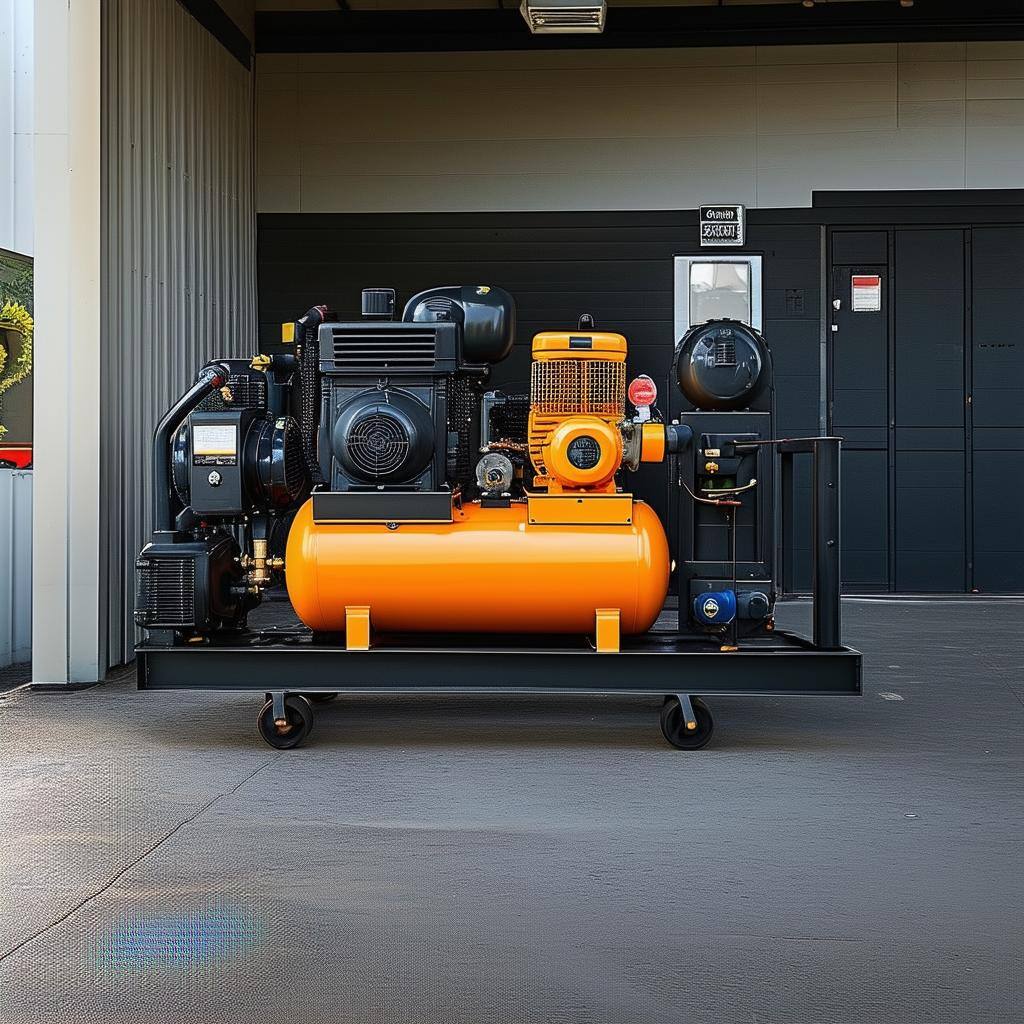SBA Loans for Real Estate Offices: A Complete Guide to Financing, Requirements, and Real-World Use...

Air compressors are essential across industries such as manufacturing, automotive repair, construction, and agriculture, providing reliable compressed air for power tools, machinery, and other equipment. However, air compressors can be a significant investment, especially for high-capacity or industrial-grade models. Financing and leasing options make it easier for businesses to access the air compressors they need without large upfront costs, allowing them to conserve cash flow and expand operational capabilities.
In this guide, we’ll cover the benefits of financing and leasing, types of air compressors, available financing and leasing options, and tips on selecting the best solution for your business.
Why Finance or Lease an Air Compressor?
Financing or leasing air compressors offers several advantages for businesses looking to conserve cash flow and optimize equipment acquisition costs. Here are some primary benefits:
1. Conserve Cash Flow
Purchasing an air compressor outright can significantly impact working capital, especially for small businesses. Financing or leasing enables you to spread payments over time, making it easier to manage cash flow and invest in other operational needs.
2. Access to High-Quality Equipment
Leasing and financing give businesses access to high-quality and industrial-grade air compressors that might otherwise be unaffordable upfront. This is particularly beneficial for companies needing robust equipment for demanding applications.
3. Tax Benefits
Depending on the financing or leasing arrangement, you may be eligible for tax deductions on interest or lease payments. Consulting with a tax advisor can help determine any specific benefits for your business.
4. Predictable Monthly Payments
With set monthly payments, financing and leasing allow for easy budgeting and cash flow management, reducing the risk of financial strain on other business expenses.
5. Upgrade Flexibility
Leasing options often allow for equipment upgrades at the end of the lease term, making it easier for businesses to keep up with the latest technology and efficiency improvements.
Types of Air Compressors Eligible for Financing & Leasing
Air compressors come in various types and configurations, each suited for specific applications and industries. Here are some common types of air compressors often eligible for financing or leasing:
- Rotary Screw Compressors: Ideal for continuous operation in industrial applications, these compressors are efficient and powerful.
- Reciprocating Compressors: Commonly used in garages, automotive shops, and light industrial settings, these compressors are durable and reliable for intermittent use.
- Centrifugal Compressors: Typically used in high-demand applications, such as large-scale manufacturing, due to their ability to generate high pressure and flow rates.
- Oil-Free Compressors: Essential for industries where air quality is critical, such as food and beverage production, pharmaceuticals, and electronics manufacturing.
- Portable Compressors: Smaller, mobile compressors used on job sites and in construction, where flexibility is needed.
- Scroll Compressors: Commonly used for medical and cleanroom applications, these compressors provide quiet, reliable performance with minimal vibration.
Air Compressor Financing Options
Air compressor financing offers different pathways to ownership, each designed to meet specific business needs. Here are some common financing options:
1. Equipment Loans
An equipment loan provides a lump sum of money to purchase the air compressor, with the compressor itself serving as collateral. You make fixed monthly payments, and at the end of the loan term, you fully own the equipment. Interest rates and terms vary depending on your credit profile and the equipment’s expected lifespan.
2. SBA Loans
Small Business Administration (SBA) loans are government-backed loans that offer competitive interest rates and longer repayment terms. The SBA 7(a) and 504 loan programs are particularly useful for equipment purchases. However, SBA loans often require more documentation and have longer approval times.
3. Business Line of Credit
A line of credit offers flexible funding, allowing you to draw on the credit line as needed, making it ideal for partial equipment purchases or covering additional expenses related to the equipment installation.
4. Term Loans
Term loans are straightforward: you receive a fixed amount for the purchase of the air compressor and repay it over a set period with fixed monthly payments. This option is best suited for businesses looking to own the equipment and prefer predictable payments.
5. Manufacturer Financing
Some air compressor manufacturers or distributors partner with financial institutions to offer in-house financing programs. These programs may come with promotional rates, extended warranties, or other benefits, making it a cost-effective choice for specific equipment brands.
Air Compressor Leasing Options
Leasing offers businesses flexibility, often allowing them to upgrade or return the equipment at the end of the term. Here are some common leasing structures:
1. Operating Lease
An operating lease allows you to use the compressor without committing to ownership. This option is suitable if you need flexibility, as you can return, upgrade, or renew the lease at the end of the term.
2. Capital Lease
A capital lease, also known as a finance lease, is designed for businesses intending to own the compressor after the lease term. Payments are typically higher, but at the end of the lease, you can purchase the equipment for a nominal fee.
3. $1 Buyout Lease
With a $1 buyout lease, you pay higher monthly installments and buy the compressor for $1 at the end of the lease term. This structure is ideal if you plan to keep the compressor long-term without a large upfront payment.
4. Fair Market Value (FMV) Lease
An FMV lease allows you to buy the equipment at its fair market value at the end of the lease term or return it. This option provides flexibility, especially if you plan to upgrade or don’t need long-term ownership.
How to Qualify for Air Compressor Financing or Leasing
Qualifying for financing or leasing depends on your business’s financial health and creditworthiness. Here’s what lenders and lessors typically evaluate:
1. Credit History
Both personal and business credit scores are crucial for determining eligibility and terms. Strong credit can lead to more favorable rates and terms.
2. Financial Documentation
Lenders may request financial statements, tax returns, and cash flow reports to assess your ability to make regular payments.
3. Business History
Established businesses with a stable financial history are generally seen as less risky and may receive better terms. However, some lenders and leasing companies offer programs for startups and newer companies.
4. Equipment Type
The type, age, and condition of the air compressor can influence the terms. Newer and more valuable equipment often qualifies for better terms since it holds value as collateral.
Steps to Secure Financing or Leasing for Air Compressors
1. Define Your Equipment Needs
Determine the type, size, and specifications of the air compressor needed, considering your industry requirements, usage needs, and project scope.
2. Compare Providers
Research different financing and leasing companies, as well as options offered by the compressor manufacturer. Look for competitive rates, favorable terms, and customer reviews.
3. Gather Financial Documents
Prepare all necessary financial documents, including credit reports, tax returns, and profit and loss statements, to streamline the application process.
4. Submit Your Application
Complete the application with the chosen provider, detailing how the air compressor will support your operations and any potential revenue increase.
5. Review and Sign the Agreement
Review the terms carefully, including monthly payments, end-of-term options, and any applicable fees. Ensure the agreement aligns with your business needs before signing.
Conclusion
Financing or leasing an air compressor is a strategic way for businesses to access essential equipment while preserving capital and managing cash flow effectively. With options like equipment loans, SBA loans, operating leases, and capital leases, there’s a solution for every business type and need. By understanding the options and assessing your financial position, you can select the best financing or leasing arrangement to support your business growth and operational efficiency.



